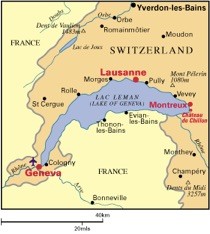
A Switzerland Family Foundation can be set up by foreigners can avoid registering with the government’s Commercial Register because family foundations are exempt, providing greater privacy. Full participation exclusively by foreigners is permitted including the founder, beneficiaries, trustee, and all assets located in other countries.
Commercial foundations pay higher corporate and income taxes than the more favored non-profit foundations and family foundations.
The law governing the formation, acceptable activities, and termination of all foundation is Civil Code Articles 80-89. Pursuant to Swiss law, a foundation is created with an endowment of assets for a specific purpose. Legal experts describe this as a legal entity with an independent pool of assets dedicated for a special purpose.
Background
Switzerland is a country located in Europe and is officially called the “Swiss Confederation”.
Its political system is described as a “federal semi-directed democracy parliamentary republic” with an elected two house assembly and a federal chancellor.
Benefits
A Switzerland Family Foundation offers these types of benefits:
• 100% Foreign Participation: Foreigners may create foundations with foreign founders, beneficiaries, managing bodies, and assets located anywhere in the world.
• Privacy: Since family foundations do not register with the government, all information about them are never in any public records.
• Low Taxes: The federal corporate tax rate is 4% with a smaller municipality tax added. However, U.S. taxpayers and everyone paying global income taxes must report all income to their governments.
• No Reporting: Family foundations are exempt from filing accounting information with the government.
• Founder Control: Founders may prepare a Charter providing powers including being the President of the governing board.
• Estate Planning: With perpetual lifespan, the foundation provides estate planning benefits for the founder’s family and their heirs forever.
• Asset Protection: As a separate legal entity owning all of the assets, future creditors of the founder and beneficiaries will be prevented from seizing the assets.
• Fast Formation: It can take one day to prepare the Charter for a family foundation.

Switzerland Family Foundation Name
Foundations must avoid using names too similar to other legal entities in Switzerland.
Most often, the foundation’s name includes the name of its founder.
Duration
Since foundations are created to fulfill a specific purpose, no limits on their lifespan duration exists under Swiss law. They are assumed to be perpetual. A Swiss court may dissolve a foundation upon petition by the management claiming that the specific purpose for the foundation has been fulfilled.

Formation
Swiss law requires the following elements in order to create a foundation: intent, purpose, assets, and organization.
Therefore, foundations are formed with a written Foundation Charter (Constitution). Every foundation must have a purpose clearly defined in its charter. A family foundation typically has the purpose of benefiting a specific family.
The Foundation Charter typically includes the following details:
• Name of the foundation;
• Founder’s name;
• Initial assets (funds or properties);
• Foundation’s purpose; and
• Names of the members of the foundation’s board.
Because a foundation is a separate legal entity most foundations must register with the Commercial Registry. However, an exception exists for family foundations.
Once the foundation’s purpose is established in the charter, it can only be changed by the managing authority such as the Foundation Board.

Private and Family Foundations
Private foundations must have a purpose described as a “noble goal”. This distinguishes them from normal foundations involved in commercial activities.
Family foundations where all of the beneficiaries are family members or otherwise close to the founder are permitted as long as all of the assets are designated for the assistance, establishment, or education of family members.
Minimum Capital
The minimum initial capital for a foundation is 50,000 CHF as established by the Federal Supervisory Board for Foundations.
Founder
The founder may be a natural person or a corporate body with nationality and residence in any country.
Founders have flexibility with management involvement such as being appointed as the president of the Foundation Council or the Foundation Board of Directors. The foundation’s purpose as defined in the Foundation Charter (Constitution) which can be written in a way which reserves certain powers with the founder.
Management
Swiss law allows for a foundation to be managed either by a Foundation Council (Stiftungsrat), or by a Foundation Board of Directors (Stiftungsvorstand). The Foundation Charter should describe whether a council or a board of directors will manage the foundation along with how they are appointed, removed, replaced, and compensated.
Beneficiaries
Family foundations require that every beneficiary either be a family member or someone close to the founder. Beneficiaries may be citizens of any country and may reside anywhere in the world.
Accounting
Family foundations are exempt from government monitoring requiring annual reports of activities and an audited financial statement.
Taxes
As separate legal entities, foundations are subject to Swiss corporate income and capital taxes. The only exception is for “non-profit” purposes for the “public benefit” foundations who enjoy 100% exemption from all taxes.
The corporate income tax is based on the profits. All contributions to the foundation by the founder are not considered profits and not taxable. Federal and district taxes on profits do not apply when the profits are under 10,000 CHF (currently $10,357 USD). Profits above that amount are taxed federally at a 4% rate. In addition, each district (municipality) imposes their own tax on the profits.
Capital taxes are based upon the market value (not book value) equity (loans and mortgages are not counted) of all assets located in Switzerland such as real estate and securities. The first 80,000 CHF (currently $82,856 USD) is exempt from the capital tax. The tax rate is 0.5% of the taxable capital.
Liabilities
Since foundations are separate legal entities, they are liable in the same manner as a corporation is liable for its debts, contractual obligations, and any harm committed to others in the course of its business.
Just like a corporation, the foundation’s governing body legally binds the foundation to contractual relationships with third parties and all its assets are subject to court ordered satisfaction of its unpaid debts and unfulfilled legal obligations resulting from the actions of its governing body.
As for the liability of the governing body’s members, Swiss foundation laws do not address this issue. Therefore, Swiss laws related to corporate board of directors members will apply. This means that the members may be liable internally both by tort or contract to employees, the founder, and the beneficiaries. Members can only be personally liable externally to third parties only by tort. A tort includes willful or negligent actions which harm others.
Public Records
No information regarding family foundations are included in any public records because they do not have to register with the government.
Time for Formation
The Charter for a family foundation can be prepared in one day.
Conclusion
A Switzerland Family Foundation provides these benefits: complete foreign participation, privacy, low taxes, founder control, no reporting, estate planning, asset protection, and fast formation.

